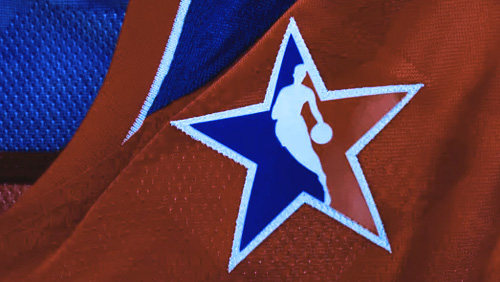Companies will soon be allowed to rent a small space on NBA jerseys, but only if their business doesn’t involve daily fantasy sports.
 Last month, ESPN’s Darren Rovell reported that that NBA board of governors has greenlighted a three-year program that will allow teams to carry advertisements on their jerseys. Basically, businesses can buy a 2.5-inch-by-2.5-inch space on regular game-day jerseys starting with the 2017-18 season.
Last month, ESPN’s Darren Rovell reported that that NBA board of governors has greenlighted a three-year program that will allow teams to carry advertisements on their jerseys. Basically, businesses can buy a 2.5-inch-by-2.5-inch space on regular game-day jerseys starting with the 2017-18 season.
NBA Commissioner Adam Silver forecast the program to bring in as much as $100 million a year, still small compared to the league’s overall revenues which Silver expects to reach $7 billion next season. According to the report, the money from the jersey advertisement will be split with the players.
But there’s a catch: the league is restricting the companies who can advertise, and the restrictions apply to businesses involved with alcohol, tobacco, politics, media, Nike competitor, or gambling including daily fantasy sports sites such as DraftKings and FanDuel.
The two rival companies already have sponsorship deals with majority of the teams in the NBA. FanDuel, in particular, has an ongoing partnership with NBA, which has stake in the DFS company.
There’s no indication why the league decided to exclude fantasy sports companies, especially since Silver already said in the past that DFS is not gambling but a game of skill. Outside of the NBA, fantasy sports logos can be seen on WNBA jerseys and even NBA D-League franchises, according to Legal Sports Report.
It’s important to note that the legality of DFS is still up for debate in a number of areas in the United States, including states with NBA franchises like Illinois, New York and Texas. So far, attorneys general in Massachusetts, Rhode Island and Kansas have ruled daily fantasy sports as legal, while 12 others believe it is illegal gambling.
Texas AG challenges DraftKings lawsuit
Speaking of Texas, state Attorney General Ken Paxton fired back at DraftKings’ lawsuit, which challenged his opinion that fantasy sports betting websites are considered illegal gambling in the state.
In January, Paxton came out with a “nonbinding opinion,” in which he said fantasy sports bets are illegal under the Texas Penal Code because the outcomes of the games “depends partially on chance,” and that the house takes a cut.
This prompted DraftKings to file a lawsuit, claiming Paxton not only “exceeded his authority in issuing the opinion” but also violated the company’s “due process rights.”
Paxton, however, said the DFS operator didn’t have a “valid due process claim.”
Courthouse News Service quoted a 42-page filing, which stated: “DraftKings does not have a constitutionally protected interest in providing input in the Attorney General’s opinion process. Further, DraftKings does not have a constitutionally protected interest in profiting from gambling that is illegal under Texas law. As a result, its federal due process claim fails on its face.”





